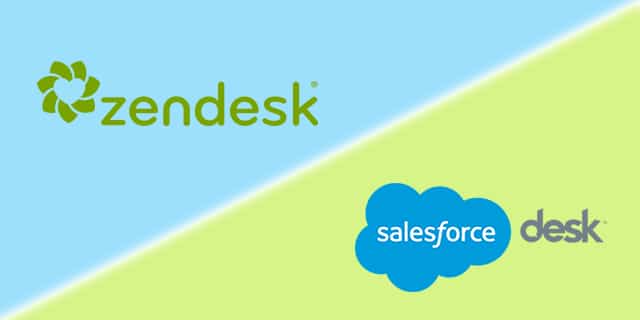Customer Service
Ultimate Customer Service Showdown: Zendesk vs Desk.com

Every company, whether a multinational corporation or a local startup, faces a unique challenge when it comes to customer service. While customer service has always been an integral part of a company, with the adoption of social media, customer experiences can go viral — both the good and the bad — making it more important than ever to be more proactive than reactive.
Software companies have saturated the market with products and applications claiming to be the end-all answer to your troubles. Knowing which product is the right fit for your company is a bit more complex than the software giants lead users to believe. There are a multitude of areas and focuses special to your business — some platforms may cater to those and others may not.
That being said, two customer service moguls, Zendesk and Desk.com, aim to reach a broad range of customers in a variety of industries and markets. Their products, while generic enough for companies across the board to adopt, are easily customizable to be used by specialty brands. What’s more, with a range of pricing options, even the small guys down the street can implement a software to better serve their customers.
To help answer your questions, we thought a good old-fashioned customer service head-to-head was in order. This is the Zendesk vs Desk.com showdown.
Company Background
Zendesk
Founded in a Copenhagen loft back in 2007, Zendesk had a mission to “bring a bit of zen to the chaotic world of customer support.” Since then, the team and company have grown and moved to San Francisco, but still aim to foster better relationships between businesses and their customers. Zendesk, now at over 800 employees, boasts 57,000 paid customer accounts in over 150 countries. The Zendesk rolodex of customers includes Shopify, AdRoll, Box, Gilt Groupe, Vodafone and more.
Desk.com
Desk.com came into the Salesforce family back in 2011 with the acquisition of Assistly. Salesforce, which has now been around for over 15 years, began with a comprehensive CRM solution and has grown to include many other marketing, sales and customer service applications. Desk.com customers include big names such as Yelp, Square, One Kings Lane and Munchery.
Pricing
Zendesk
A starter plan at Zendesk, with email ticketing, built-in knowledge base and 140+ pre-built apps begins at just $1 per agent each month (with a limit of three agents). On the other end of the spectrum, the flagship service plan, called Enterprise Elite, includes a plethora of standard features, elite support, product training and uptime SLAs, for the cost of $195 per agent each month.
Most small to medium-sized companies would be satisfied with either the $25 Regular plan or $59 Plus plan, which include features like satisfaction surveys, communities, time tracking and custom reporting, depending on the selection.
Desk.com
Much like Zendesk, there is a limited functionality starter plan available for up to three agents, at just $3 per agent each month. The chart-topping Enterprise plan rings in at $135 per agent each month and features enterprise analytics, SLAs and a customizable console, among others.
The Standard package, at $30 per agent each month, offers case management, multi-channel support, mobile applications and self-service support; while the most popular Pro plan adds Desk Connect for Salesforce, open CTI, advanced reporting and native CSAT.
Key Features
There are an assortment of features built in to customer service applications, most of which are covered in our free Top 10 Customer Service Software Report. For this post, we’ll share our top four features, which both Zendesk and Desk.com offer.


Applications and Integrations
Zendesk
There are an assortment of tools that integrate with the Zendesk platform, including apps like 8×8 Virtual Office, BigCommerce, Box and FreshBooks. Additionally, there are integrations for chat, IT management, project management and time tracking. For a full list of integrations, along with screenshots of the apps in use, visit the Zendesk Apps page.
Desk.com
As a Salesforce company, the most native integration for Desk.com is the Salesforce platform itself. The team behind the platform has also built in integrations for chat and collaboration, ecommerce, marketing management and issue tracking. Some of the featured applications include HipChat, MailChimp, Shopify and Zapier. To explore the complete list, visit the Desk.com website.
Support
Zendesk
The support team behind Zendesk offers a collection of how-to guides, a knowledge base and community forum, along with the usual chat and email options.
Desk.com
Similar to Zendesk, Desk.com offers its users an extensive Support Center knowledge base, along with a community forum. The support team also includes telephone and email support.
Ease of Use
Zendesk
There’s no better way to say it — using Zendesk is easy. Simply navigate to the customized URL assigned when joining, enter your credentials and you’re looking at your dashboard with open tickets, notes, statistics and more. Assigning tickets, changing priority, tagging and responding is easy with a few clicks and drop-down menus. Support staff can mark entries as public replies or internal notes, and even attach files to responses.
Along with the list of trackable KPIs, the customer experience can also be tracked via surveys — adding an additional way to make customers feel that you care for them and their experience. What’s more, with the amount of relative data the system collects, managers can make more informed decisions on everything from support staffing levels to the complexity of your new website.
Desk.com
The Desk.com application also boasts a very minimalistic interface and dashboard. Open tickets feature a small color-coated icon for an at-a-glance view of their current status. Interestingly, Desk.com’s designers decided to assign priority by a 1-10 rating, rather than the traditional low-high ratings. While easy to use, the interface doesn’t feel as intuitive or light as Zendesk’s offering. That being said, it is a fully capable platform that many teams would be happy with — but if you’re considering the switch from Zendesk, this may take a little time to get used to.
The Desk.com platform, while clean and simple in appearance, feels a bit heavy when navigating. Changing ticket statuses and running reports seemed to take longer than expected throughout the testing process. Once the reports did crunch the numbers, however, we were left with valuable data in a very attractive delivery. Along with the rest of its applications, there are numerous reporting and analytics offerings available for a full range of reports.
And the Winner Is…
Overall, both of these applications are very powerful in what they can accomplish for your customer service teams. Considering the user interface, Zendesk may outshine Desk.com ever so slightly, based on the ease of use and speed. The application also feels superior as far as how intuitive the actions are to the user. With that said, if your team relies heavily on Salesforce, the benefit of direct integration to the platform may compensate for the shortage in speed.
There you have it: for those without the need for Salesforce integration, Zendesk may be your best option; while those needing the CRM may want to select the native Desk.com. Note, both platforms offer free trials for those looking to give each application a try-before-you-buy test drive.






